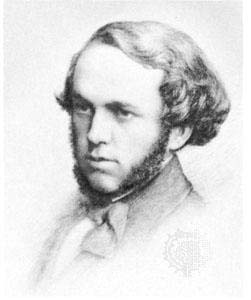 This posting is part of a series on F W Boreham and the authors who influenced his literary style. This article looks at the author, Mark Rutherford[1]:
This posting is part of a series on F W Boreham and the authors who influenced his literary style. This article looks at the author, Mark Rutherford[1]:Affinity With Rutherford
Frequently throughout Boreham’s writing career, he referred to the fondness that he had for the journalist, novelist and critic, Mark Rutherford (1831-1913).[2] Boreham imbibed many of the ideas of this “unjustly neglected writer”[3] including the value of respectability,[4] the ethics of friendship[5] and the tragedy of losing touch with reality by “luxuriating among the cowslips”.[6]
Love of Nature
It was, however, Rutherford’s nature themes that most significantly shaped Boreham’s thinking and behaviour. The comfort of strolling under the stars[7] and the therapy of the ocean waves were part of Rutherford’s prescription for loneliness and little-mindedness that Boreham consistently applied to himself, especially in the troubled later years of his life.[8] The value of regular contact with ‘life’s immensities’ is a Rutherfordian theme that Boreham developed in different ways.[9]
Shy English Author
An element that impressed Boreham was the authentic way Rutherford “reduced his personality to paper”.[10] Perhaps Boreham enjoyed Rutherford because he saw much of his own personality mirrored in this man who “hated formality and fuss” and was extremely shy.[11] Mark Rutherford lived in a secluded village near Tunbridge Wells and “concealed his identity behind an inscrutable nom-de-plume” (his real name was William Hale White). Reflecting on his own upbringing in Tunbridge Wells, Boreham wrote, “I hate to think I passed Mark Rutherford on the street without knowing his identity”.[12] While admitting that Australians may not like his hero, Boreham revealed the source of his admiration when describing William Hale White as “geographically intensely English, historically intensely mid-Victorian and temperamentally intensely introspective”.[13] Rutherford reminded Boreham of his roots and the English values that he prized. As seen earlier, Boreham concealed his thinking behind the guise of ‘John Broadbanks’ and particularly in his editorials he displayed a Rutherford-like restraint in refraining from references to himself. An example of authorial disclosure is found in an editorial about Catherine Booth when Boreham implies that he had attended her funeral.[14]
Fresh and Clear Style
Regarded by an early reviewer as “the highest imaginative art”,[15] Boreham’s most glowing tribute to Mark Rutherford was to describe his writing as “the supreme example of all the best English composition ought to be”.[16] Boreham held Rutherford up to young writers as a model because he saw his diction was “as fresh and as modern as this morning’s sunshine”.[17] According to Boreham no one wrote more simply than Rutherford for “every word is the right word and every sentence is crystal clear”.[18] J J North judged Boreham’s early literary ventures to be “long-worded” because “the terse Boreham had not arrived”.[19] Amid the many admiring reviews, it was said of Boreham’s Whisper of God that “if illustrations and incidents did not jostle so thickly on the pages and the poetical quotations were remorselessly reduced the sermons would gain much in value”.[20] Boreham’s work in modelling his writing on Rutherford became evident through the removal of wordy clutter and the emergence of a simple and flowing expression.
Simplicity
One might conclude that Boreham lauded Mark Rutherford merely because the latter “placed a consistent emphasis on the need for developing the faculty of admiration”.[21] Boreham retained a geographical and a temperamental affinity with this writer from Kent and adopted many of his major ideas. However, it was the simplicity of Rutherford’s art which “touches the imagination [and] does not strike it dumb with over-explanatory detail” which provided the most formative influence on Boreham’s writing style.[22]
Geoff Pound
Image: Mark Rutherford
[1] William Hale White was an English writer who adopted the pseudonym, ‘Mark Rutherford’. His first two novels are autobiographical and are concerned with the subject of loss of faith. More information on William Hale White can be found in the Bloomsbury guide to English literature, 1016.
[2] F W Boreham, The luggage of life (London: The Epworth Press, 1912), 125; F W Boreham, Mushrooms on the moor (London: The Epworth Press, 1915), 27.
[3] James A Michie, ‘The wisdom of Mark Rutherford’, London Quarterly 184 (1959): 126.
[4] Boreham, Mercury, 31 October 1931.
[5] Boreham, Mercury, 10 August 1957; Age, 30 April 1949.
[6] Boreham, Mercury, 24 September 1955.
[7] Boreham, Mercury, 8 June 1935.
[8] Boreham, Mercury, 10 September 1949.
[9] Boreham, Mercury, 28 May 1955.
[10] Boreham, Mercury, 12 March 1938.
[11] Rosemary Beresford, ‘Mark Rutherford and hero-worship’, Review of English studies 23 (1955): 264.
[12] Boreham, Cliffs of opal, 161.
[13] Boreham, Mercury, 2 April 1932.
[14] Boreham, Mercury, 4 October 1947.
[15] Frances Low, ‘Mark Rutherford: An appreciation’, Fortnightly Review 84 (1908): 460.
[16] Boreham, Mercury, 12 March 1938.
[17] Boreham, Cliffs of opal, 161.
[18] Boreham, Mercury, 12 March 1938.
[19] J J North, New Zealand Baptist, April 1943.
[20] Review of Whisper of God, (n.p., n.d.). This review appears in a cutting that Boreham kept in his own copy of his book, Whisper of God.
[21] Low, ‘Mark Rutherford: An appreciation’, 126.
[22] Low, ‘Mark Rutherford: An appreciation’, 124.